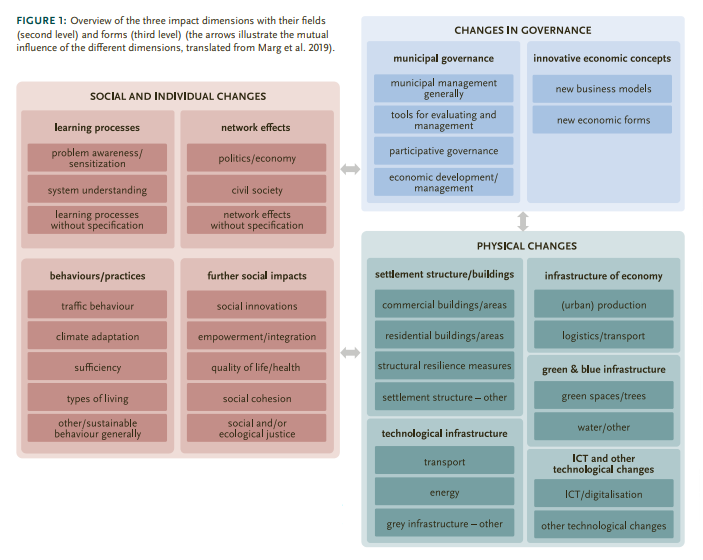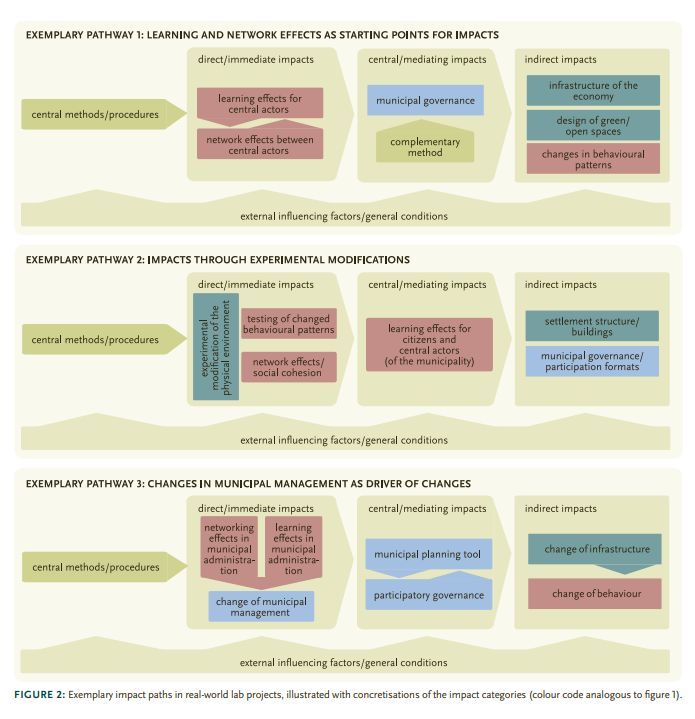Real-world laboratories aim to generate societal impacts and contribute to sustainability transformation. In a new publication, Michael Kreß-Ludwig, Oskar Marg, Rieke Schneider, and Alexandra Lux present a systematization of these impacts and their interconnections and outline key principles for designing real-world laboratory projects to promote societal impacts. The publication appears in the early 2024 GAIA Special Issue "Impacts of Real-world Labs in Sustainability Transformations."
The study is based on the empirical analysis of 48 transdisciplinary urban research projects and in-depth qualitative case studies of six of these projects. It was carried out as part of an accompanying research programme. All projects researched different topics of urban sustainability transformation and worked with a transdisciplinary real-world lab approach.
As a result, three dimensions of social impacts were identified: 1. Social and individual changes, 2. Changes in governance and 3. Physical changes.

Source: Kress-Ludwig et al. 2024, 14, Figure 1
Based on the six in-depth case studies, three patterns of impact pathways were also identified:
1. An impact pathway from social change through governance change to individual and physical change;
2. An impact pathway from experimental physical and social/individual changes to social changes and further to permanent physical and governance changes;
3. An impact pathway from social changes and governance innovations to implemented new governance formats and finally to physical and behavioural changes.

Source: Kress-Ludwig et al. 2024, 15, Figure 2
In addition, ten key principles for the effective design of real-world laboratories are presented. These can be read in more detail elsewhere: https://www.nachhaltige-zukunftsstadt.de/downloads/SynVerZ_Werstattbericht_Wirkungen_Thesen.pdf
Overall, the findings improve the understanding and promotion of sustainability transformations in urban areas. The transferability of the results to other fields of action, which were not included in the projects analysed here, still needs to be researched. Future funding programmes should specify their objectives with regard to the expected societal impacts and establish systematic accompanying research that makes it possible to review the achievement of objectives beyond the duration of an individual project.
Kreß-Ludwig, Michael; Marg, Oskar; Schneider, Rieke; Lux, Alexandra (2024): Lessons from transdisciplinary urban research to promote sustainability transformation in real-world labs: Categories, pathways, and key principles for generating societal impact, GAIA - Ecological Perspectives for Science and Society, 33(S1),10 – 17. https://doi.org/10.14512/gaia.33.S1.3
The publication is available open access.
